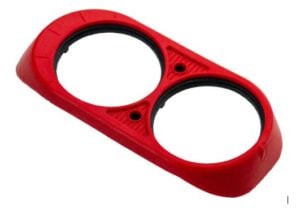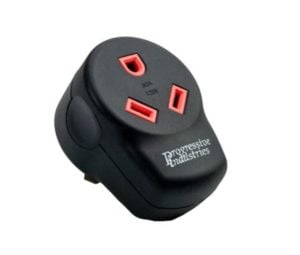Rubber Over Moulding Solutions
As a supplier of injection moulded enclosures, Rubbertech are aware of the customer’s need for overmolding silicone to seal their assemblies.
Where a high sealing IP rating is required, Rubbertech can offer a unique over-moulding solution that removes the concern of leakage between the plastic enclosure and mating component. The advantages of this solution include achieving fully bonded components with various material combinations.
Our advanced moulding technology and custom LSR solutions ensure high performance in every application. Every aspect of our overmolding process can be tailored to meet specific customer needs, showcasing our ability to customise services and solutions in quality control, mould design, and prototyping.
The solution we offer uses both mechanical and chemical bonding to ensure the very best seal is achieved, making it ideal for high-temperature and high-pressure applications.
We pre-mould the plastic component and then load this into the Liquid Silicone (LSR) injection tool. Unlike HCR silicone used in compression moulding, the liquid silicone process does not require high compression forces, so it does not have any effect on the plastic enclosure within the LSR mould. This process also allows the incorporation of other thermoplastics, enhancing versatility.
Rubbertech is committed to delivering exceptional quality control in our overmolding process, ensuring low defect rates and adherence to industry certifications.
This process is not just for sealing but can be used to improve the durability and visual aesthetic of plastic mouldings by offering silicone over-moulded skin to protect against damage. Without the sinkage issues associated with 2-shot injection moulding, liquid silicone offers a high-quality solution by over-moulding a completed entity with silicone.
Materials we can overmold include the following; however, if you have a specific material not listed, please let us know and we can confirm availability. All colours are available as well as a wide selection of LSR hardness grades.
Our extensive experience in working with Liquid Silicone Rubber (LSR) components ensures that we possess the specialised knowledge and expertise necessary for successful overmolding projects. This deep understanding of the tooling and LSR nuances allows us to deliver high-quality solutions tailored to your needs.


LSR Overmolding with Various Materials
LSR & Nylon
Liquid Silicone Rubber (LSR) overmolding with Nylon offers a robust solution due to the desirable characteristics of both materials, such as high mechanical strength, chemical resistance, biocompatibility, hypoallergenicity, odorlessness, and tastelessness. This combination is ideal for consumer goods and automotive components where durability is crucial.
LSR & Glass-filled Nylon
By utilising the injection moulding process to combine LSR with glass-filled Nylon, you achieve enhanced rigidity and thermal stability. This pairing is perfect for high-performance applications in electronics and industrial machinery where the components must withstand significant stress and temperature variations.
LSR & PC (Polycarbonate)
LSR overmolding with Polycarbonate provides an excellent balance of toughness and clarity, with careful design considerations playing a crucial role in combining these materials effectively. This combination is commonly used in medical devices and protective cases, offering impact resistance and high optical clarity.
LSR & PPSU (Polysulfone)
Overmolding LSR with PPSU helps solve specific challenges related to chemical resistance and thermal stability. This pairing is often utilised in medical and food processing industries due to its ability to withstand repeated sterilisation cycles.
LSR & PP (Polypropylene)
Combining LSR with Polypropylene is a good choice due to its flexibility and good chemical resistance, making it suitable for applications in the packaging and consumer goods sectors, where lightweight and durable materials are essential.
LSR & PBT (Polybutylene Terephthalate)
LSR overmolding with PBT provides excellent electrical insulation and mechanical properties, making it ideal for electronic devices and automotive parts that require reliability and performance under stress. Our services in combining LSR with PBT include comprehensive support throughout the entire production process, from design and prototyping to packaging and delivery.
LSR & PET (Polyethene Terephthalate)
LSR and PET overmolding is often used in applications where moisture resistance and dimensional stability are necessary, such as in food and beverage packaging and automotive components. We specialise in combining LSR with PET to deliver exceptional quality control and customise our processes for large volume orders.
LSR & Metal Components
Overmolding LSR onto steel and other metal components is a versatile process that enhances grip, ergonomics, and chemical resistance. This combination is widely used in the manufacturing of tools, handles, and medical instruments.
LSR & Glass
LSR overmolding with glass creates components with excellent optical clarity and chemical resistance, suitable for use in lighting applications and electronic displays around the world.
LSR & PCBA (Printed Circuit Board Assembly)
Overmolding LSR onto PCBA protects sensitive electronic components from moisture, dust, and mechanical shock, ensuring reliability and longevity in complex electronic assemblies. Our collaboration with prominent Fortune 100 and Fortune 500 companies underscores our capability in delivering high-quality custom silicone rubber over-moulded parts.
For more information about our Liquid Silicone overmoldings, please contact our engineering sales team. Understanding various processes is crucial for achieving high-quality multi-substrate components.
FAQ About Rubber Over Moulding
What is Rubber Over Moulding?
Rubber overmolding, specifically the LSR overmolding process, is a manufacturing technique where a layer of rubber or silicone is moulded over a substrate, which can be metal or plastic. This process enhances the durability, grip, and aesthetic appeal of the final product.
What materials can be used in Rubber Over Moulding?
Various materials can be used in rubber overmolding, including Liquid Silicone Rubber (LSR) components, Nylon, Polycarbonate, Polypropylene, and even metal components. Each material offers unique advantages, such as chemical resistance, flexibility, or thermal stability.
What are the advantages of Rubber Over Moulding?
The advantages of rubber overmolding, including the creation of overmolded components, encompass improved sealing capabilities, enhanced grip and ergonomics, chemical and temperature resistance, and the ability to combine multiple materials for superior performance. It also provides a cost-effective solution for producing high-quality, durable components.
Can Rubber Over Moulding be used for electronic devices?
Yes, rubber overmolding is ideal for electronic devices, particularly for creating durable grips. It protects sensitive components from moisture, dust, and mechanical shock, ensuring reliability and longevity, especially in complex electronic assemblies.
How does Rubber Over Moulding differ from 2-shot moulding?
Rubber overmolding involves injection moulding a layer of rubber or silicone over a pre-existing substrate, whereas 2-shot moulding involves injecting two different materials into a mould simultaneously. Rubber overmolding offers more flexibility in material choice and is often used when specific material properties are required.
Is Rubber Over Moulding suitable for high-temperature applications?
Yes, rubber over-moulding is suitable for high-temperature applications. The process often utilises materials like LSR that provide excellent thermal stability, making it ideal for environments with extreme temperature variations.
How can I start a Rubber Over Moulding project?
To start a rubber overmolding project, contact our engineering sales team to discuss your prototyping needs. They will assist you in choosing the right materials and processes to meet your specific needs and ensure high-quality results.